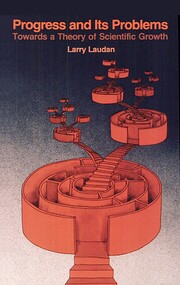

Fai clic su di un'immagine per andare a Google Ricerca Libri.
|
Sto caricando le informazioni... Progress and Its Problems: Towards a Theory of Scientific Growthdi Larry Laudan
 Nessuno Sto caricando le informazioni...
Iscriviti per consentire a LibraryThing di scoprire se ti piacerà questo libro. Attualmente non vi sono conversazioni su questo libro.   ) )nessuna recensione | aggiungi una recensione
"A book that shakes philosophy of science to its roots. Laudan both destroys and creates. With detailed, scathing criticisms, he attacks the 'pregnant confusions' in extant philosophies of science. The progress they espouse derives from strictly empirical criteria, he complains, and this clashes with historical evidence. Accordingly, Laudan constructs a remedy from historical examples that involves nothing less than the redefinition of scientific rationality and progress . . . Surprisingly, after this reshuffling, science still looks like a noble-and progressive-enterprise ... The glory of Laudan's system is that it preserves scientific rationality and progress in the presence of social influence. We can admit extra-scientific influences without lapsing into complete relativism. . . a must for both observers and practitioners of science." --Physics Today "A critique and substantial revision of the historic theories of scientific rationality and progress (Popper, Kuhn, Lakatos, Feyerabend, etc.). Laudan focuses on contextual problem solving effectiveness (carefully defined) as a criterion for progress, and expands the notion of 'paradigm' to a 'research tradition,' thus providing a meta-empirical basis for the commensurability of competing theories. From this perspective, Laudan suggests revised programs for history and philosophy of science, the history of ideas, and the sociology of science. A superb work, closely argued, clearly written, and extensively annotated, this book will become a widely required text in intermediate courses." --Choice Non sono state trovate descrizioni di biblioteche |
Discussioni correntiNessunoCopertine popolari
 Google Books — Sto caricando le informazioni... Google Books — Sto caricando le informazioni...GeneriSistema Decimale Melvil (DDC)501Natural sciences and mathematics General Science Philosophy and theoryClassificazione LCVotoMedia: (3.81) (3.81)
Sei tu?Diventa un autore di LibraryThing. |
||||||||||||||||||||||||||||||||||||||||||||||||||||||||||||||||||||||||||||||||||||||||||||||||||||||||||||||||||||||||